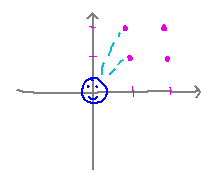Misc
LaTeX Workshop
LaTeX is a powerful word processor (“typesetter” might be more accurate) for math. I highly recommend it for writing in this class, and for writing math (and other things) in general.
PRISM is running a workshop introducing it this Wednesday (Jan. 24) from 2:30 - 4:00 in South 329.
(We’ll also do an introduction to it in class on Friday.)
Dreamer Talk
“The Lonely Reality of an Academic Dreamer.”
Thursday (Jan. 25), 7:00 PM, Newton 202.
Prof. Pamela Harris, Williams College.
Colloquium
“Invisible Lattice Points”
Looks at questions related to what integer-coordinate points or regions you can “see” from the origin if closer points block the view of ones farther away.

Prof. Pamela Harris, Williams College.
Friday (Jan. 26), 2:30 PM, Newton 214.
Extra credit equivalent to up to 2 points on a problem set for going and writing a paragraph on connections you make to the talk. “Due” any time before our final exam.
Questions?
Statements
Section 1.1
Statements in General
Key ideas from the reading: a mathematical statement is an assertion (i.e., English statement) that is unambiguously true or false (and not both, e.g., no opinions count as mathematical statements).
Which of the following are mathematical statements?
- 1 + 2 = 3. This is a statement, since it’s an assertion (even though written in mathematical notation rather than English) that can be objectively checked for truth/falsehood. It’s true.
- 1 + 2 = 107. This is also a statement, even though it’s false.
- 8:30 classes suck. This is not a statement because it’s an opinion.
- a × b = b × a. This is not a statement, because you can’t tell if it’s true or false until you know more about what the variables represent.
- If a and b are real numbers, then a × b = b × a. This is a statement, since the variables are well enough defined by the “if...” to tell that the claim is true.
- The derivative with respect to x of 3x2 is 6x. This is a statement. It’s about a relationship between functions, not about the variable, so having a variable doesn’t pose a problem. Although purists might argue that without knowing the domain of the function we can’t really know what multiplication and exponentiation mean, whether the derivative is defined, etc.
- This statement is false. This is not a statement, because it’s neither true nor false -- it’s a paradox.
- Fluffy is a cat. This is not a statement, because the name “Fluffy” plays essentially the same role in English that a variable plays in math. Until you know what specific object “Fluffy” stands for, you can’t tell if the assertion is true or false.
- Prof. Baldwin owns a cat. By the same reasoning as above, “Prof. Baldwin” could denote any of many professors named “Baldwin,” you need to know which specific one to determine if the assertion is true. Although in the context of this course, there seems to be a unique “Prof. Baldwin.”
- Every even number n > 2 can be written as a sum of 2 prime numbers. This is a statement, as long as we agree on the vocabulary of “even” and “prime” numbers. The fact that you don’t know whether it’s true or not doesn’t matter -- it has to be one or the other, which is sufficient to make it a mathematical statement. (In fact, no-one knows if this is true. It’s called the Goldbach conjecture and has been around since 1742; people have found lots of even numbers for which it holds and none for which it doesn’t, but no-one has been able to prove it.)
Conditional Statements
Key ideas from the reading: A conditional statement is a statement of the form “if P, then Q.” P is called the hypothesis of the statement, and Q the conclusion.
Classify the following as either true, false, or not a statement:
- If 7 > 4, then 8 > 5. True.
- If 7 > 4, then 2 < 0. False. A true hypothesis has to imply a true conclusion.
- If 2 < 0, then 8 > 5. True. A false hypothesis can imply anything.
- If 2 < 0, then 1 < -1. True for the same reason. This offers another glimpse of why the “false implies anything” rule makes sense: while we know that 2 is not less than 0, if it were subtracting 1 from both sides would yield 1 < -1, so it is indeed the case that if 2 were less than 0, then 1 would also have to be less than -1.
- If today is Monday, then 8:30 classes suck. This is still subjective and so not a statement. While conditionals can give you a way to define variables and thereby make non-statements involving them into statements, conditionals can’t turn every non-statement into a statement.
- If Socrates is human, then Socrates is mortal. If you accept that all humans are mortal, then this is a true statement. The hypothesis defines the otherwise-variable “Socrates” as being human, in which case the conclusion follows.
Take-Aways
Key points from the reading and these exercises are...
- The definition of “mathematical statement,” given above
- Conditional statements, also defined earlier
- The not-immediately-intuitive rules for when a conditional is true: when the hypothesis and conclusion are both true, or the hypothesis is false regardless of the truth of the conclusion.
Problem Set
See handout for details.
Demonstration of how to set up grading appointments via Google calendar.
Next
Formal proofs.
Read section 1.2.